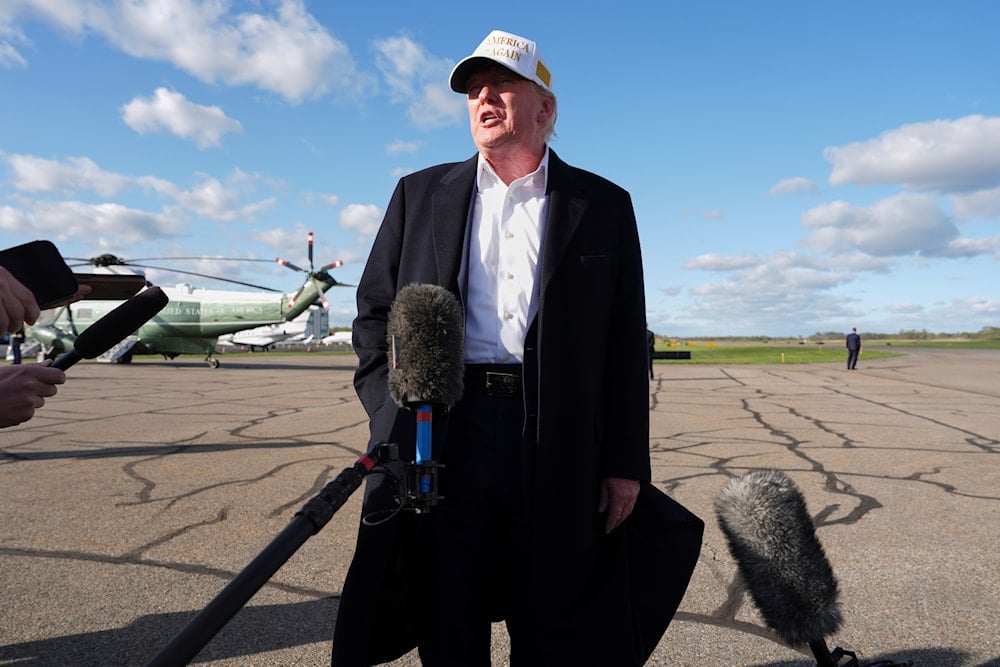Global race to attract US scientists intensifies amid Trump fund-cuts
Countries worldwide are luring US researchers with promises of better funding and freedom as Trump's science cuts destabilize the US' research landscape.
-

US President Donald Trump speaks with reporters before boarding Air Force One at Morristown Municipal Airport, Sunday, April 27, 2025, in Morristown, NJ. (AP)
The global competition to attract US researchers is intensifying as US President Donald Trump’s deep cuts to science funding and federal agencies continue to destabilize the country’s research environment, Bloomberg reported on Monday.
Countries including Canada, France, Germany, Denmark, Norway, and Australia are offering enhanced research funding, streamlined immigration processes, and competitive relocation packages to attract scientists facing growing uncertainty in the United States.
A March survey by Nature revealed that over 75% of 1,200 US scientists surveyed are now considering leaving the country, with Europe and Canada ranking among their top destinations.
Norway’s Minister of Research and Higher Education, Sigrun Aasland, stated, “Academic freedom is under pressure in the United States, and it is an unpredictable situation for many researchers in what has been the world’s leading research nation for many decades.”
The Trump administration has suspended key federally funded research programs and implemented widespread job cuts under a government-wide austerity campaign led by billionaire Elon Musk. Court orders have temporarily halted these layoffs, reinstating many federal employees, including scientists, but further reductions are expected. Stricter immigration policies and disputes over scholarly independence have further fueled instability.
Global incentives lure US scientists
Norway has introduced a 100 million kroner ($9.6 million) fund to attract top international researchers, a move fast-tracked in response to the latest US funding reductions. Aasland emphasized Norway’s readiness to support displaced scientists “as fast as possible.”
Australia’s Academy of Science has launched a Global Talent Attraction Program aimed at US researchers and returning Australian scientists. The program’s president, Chennupati Jagadish, said it is specifically designed to support those affected by the US funding environment.
Canada’s University Health Network in Toronto has initiated the “Canada Leads 100 Challenge” to recruit early-career researchers. Its president, Kevin Smith, highlighted the urgency, noting increased interest from US-based scientists.
Madhukar Pai, chair in epidemiology at McGill University, reported a surge in job inquiries from US researchers and expects record applications for a tenure-track position.
European nations step up recruitment
In Europe, Germany’s BioMed X institute in Heidelberg has launched the XBridge Program, connecting US NIH grant recipients who lost funding with potential pharmaceutical industry partners. Founder Christian Tidona described it as a “new door” for affected researchers.
The Netherlands and Belgium have set up dedicated funding initiatives and new postdoctoral positions to attract American scientists.
A coalition of twelve European countries, including France, Germany, and Spain, has called for coordinated support for scientists impacted by politically driven funding cuts, according to Politico.
France’s “Choose France for Science” initiative actively promotes the country as a haven for researchers in health sciences, climate studies, biodiversity, and artificial intelligence. Yasmine Belkaid, president of the Pasteur Institute and former NIH researcher, stressed that “The freedom and independence of science must be defended collectively,” calling this a “unique opportunity” for Europe to reassert global leadership in research.
Denmark also seeks to recruit 200 US researchers within three years. Brian Mikkelsen, CEO of the Danish Chamber of Commerce, underscored Denmark’s dedication to scientific values and evidence-based research.
US research sector faces deepening crisis
Within the United States, the research environment continues to decline. The Trump administration has cut 20,000 positions from public health agencies, including the Centers for Disease Control and Prevention, the National Institutes of Health, and the Food and Drug Administration.
HHS Secretary Robert F. Kennedy Jr. defended these measures as part of the “Make America Healthy Again” agenda, but critics warn they threaten national security and weaken pandemic preparedness.
Over 500 university presidents have condemned what they describe as unprecedented governmental intrusion into academia. Harvard University has taken legal action against the funding reductions, further escalating the conflict.
“American science is gravely wounded,” Arthur Caplan, professor of bioethics at NYU Grossman School of Medicine, told Bloomberg.

 4 Min Read
4 Min Read










